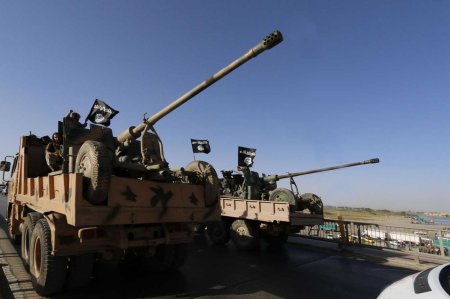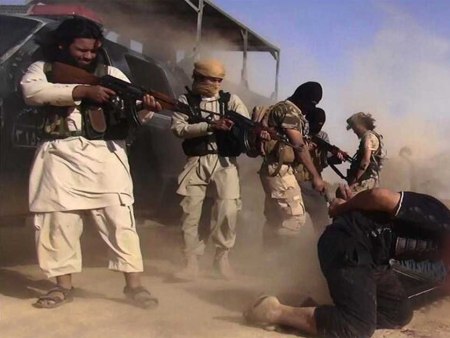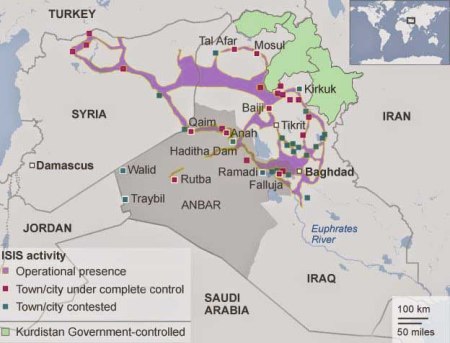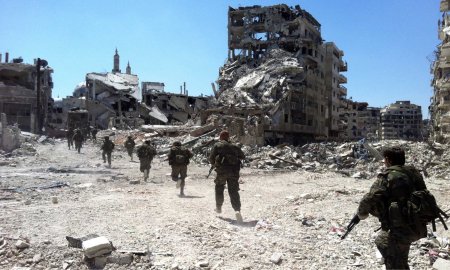Abdullah Suleiman Ali As-Safir
The battle for control of the Syrian army’s last remaining base in Raqqa province, the Tabaqa Military Airport, is underway in a confrontation that promises to be extremely difficult for both sides.
A suicide bombing carried out by a member of IS (Islamic State) on the perimeter of the airport was followed by a wide-scale offensive that began on the night of August 19. This came after many probing attacks from IS to test the resolve and strength of the garrison, an indication that the battle has entered a critical phase.
Clashes subsided somewhat yesterday morning (August 20), after the first wave of attacks by the extremist organization failed, only to intensify anew in the afternoon, when IS re-attempted to breach the airport perimeter, leading to intense fighting.
Reporters affiliated with IS claim that the organization’s fighters succeeded in downing a warplane above the airport and that they managed to take control of an unspecified Syrian army position near the airport, believed to be one of the security checkpoints spread around the airport. In response, warplanes launched several strikes against IS troop formations and a number of villages, such as al-Safsaf, where IS supply warehouses are located.

The outcomes of the clashes over the past two days indicate that the battle for the airport will not be easy for either side. On one end, the suicide attack carried out by Abu Obaida al-Masri failed to create a breach allowing entry inside the airport. On the other end, the task of defending the airport will be more difficult for its garrison, due to the loss of weapons support once provided by the 17th Division and the 93rd Brigade, which targeted IS positions and columns during previous attacks.
The difficulty of the battle may be the reason why both sides brought in additional reinforcements, in preparation for violent confrontations to come. In this regard, a source close to IS confirmed that a large number of Chechen and Caucasus fighters were called in to spearhead the attack on the airport, most of whom participated in last year’s storming of the Meng Military Airport in Aleppo’s countryside, where they gained combat experience that may be put to use in the battle for the Tabaqa airport.
Furthermore, sources on the battlefield told As-Safir that the Syrian army strengthened its fortifications inside the airport and supplied its garrison with large quantities of ammunition and food, as well as an unknown number of additional troops, called to supplement the hundreds of soldiers already there. This is an indication that a decision has been made to hold Tabaqa airport, not only due to its importance in future plans to regain control of Raqqa province from IS, but also because it forms a barrier protecting the Deir ez-Zor airport, which would be seriously threatened if Tabaqa airport fell.
On another front, tensions continued in Aleppo’s northern countryside as IS took control of the border towns of Akhtarin, Dabiq, Doudiyan, as well as other villages adjacent to the Turkish border, as the organization continued its advance toward Marea in the west and Azaz in the north, where a border crossing with Turkey is located. As a result, the Islamic Front, in a joint effort with other armed factions, is trying to repel IS’ attack and prevent the latter from advancing toward those two cities, considered to be main strongholds of the Islamic Front.

Furthermore, the Islamic Front fears falling victim to unexpected surprises, particularly a switch of allegiance by some factions, which might suddenly favor its foe, as occurred in Abu Kamal, when Jabhat al-Nusra warlords surrendered the city and pledged allegiance to IS leader Abu Bakr al-Baghdadi.
In this context, the Abdul Aziz Salamah-led Islamic Front in Aleppo issued a statement demanding that the Army of Muhammad withdraw from Azaz within three days, due to security considerations.
The statement reads: “You are well aware of the dangerous security situation that prevails in the region, particularly in Azaz city. As a result, we ask that you withdraw from the area within a maximum period of three days, asking God to safeguard the lives of Muslims, and preclude us from using our weapons, except to overthrow the criminal regime and overcome the wicked.”
The statement came following the Islamic Front having received information that the Army of Muhammad intended to remain non-aligned in any fight with IS, while it should also be noted that Jabhat al-Nusra had announced a while ago that it did not have any organizational relationship with the Army of Muhammad. This announcement reinforced existing suspicions about the Army of Muhammad and exacerbated the lack of trust toward it by past allies.
The Army of Muhammad is composed of 300 to 400 fighters, mostly Egyptians, led by Abu Obaida al-Masri. Recent rumors indicate, that Masri was incensed by Jabhat al-Nusra’s announcement that the two factions were not affiliated, an announcement which was surprising because he had pledged allegiance to Jabhat al-Nusra leader Abu Mohammed al-Golani six months ago. This affront is thought to have lead to Masri’s rapprochement with IS, and it is a prime concern of the Islamic Front, that he has secretly pledged allegiance to IS leader Baghdadi.

In a related development in Hassakeh province, the Syrian Observatory for Human Rights reports that clashes erupted in the countryside around the town of Yarubia between IS and Kurdish People’s Protection Units, as IS continued to advance in the area. The statement added that on August 19 IS had taken control of the village of Jazaa near the Syrian-Iraqi border adjacent to Yarubia.
The Syrian news agency SANA reported that the Syrian army was advancing in the town of Atman in Daraa’s countryside. It quoted a field commander as saying, “Terrorist movements there are now within range of army fire, bringing the town under effective military control.”

The battle for control of the Syrian army’s last remaining base in Raqqa province, the Tabaqa Military Airport, is underway in a confrontation that promises to be extremely difficult for both sides.
A suicide bombing carried out by a member of IS (Islamic State) on the perimeter of the airport was followed by a wide-scale offensive that began on the night of August 19. This came after many probing attacks from IS to test the resolve and strength of the garrison, an indication that the battle has entered a critical phase.
Clashes subsided somewhat yesterday morning (August 20), after the first wave of attacks by the extremist organization failed, only to intensify anew in the afternoon, when IS re-attempted to breach the airport perimeter, leading to intense fighting.
Reporters affiliated with IS claim that the organization’s fighters succeeded in downing a warplane above the airport and that they managed to take control of an unspecified Syrian army position near the airport, believed to be one of the security checkpoints spread around the airport. In response, warplanes launched several strikes against IS troop formations and a number of villages, such as al-Safsaf, where IS supply warehouses are located.

The outcomes of the clashes over the past two days indicate that the battle for the airport will not be easy for either side. On one end, the suicide attack carried out by Abu Obaida al-Masri failed to create a breach allowing entry inside the airport. On the other end, the task of defending the airport will be more difficult for its garrison, due to the loss of weapons support once provided by the 17th Division and the 93rd Brigade, which targeted IS positions and columns during previous attacks.
The difficulty of the battle may be the reason why both sides brought in additional reinforcements, in preparation for violent confrontations to come. In this regard, a source close to IS confirmed that a large number of Chechen and Caucasus fighters were called in to spearhead the attack on the airport, most of whom participated in last year’s storming of the Meng Military Airport in Aleppo’s countryside, where they gained combat experience that may be put to use in the battle for the Tabaqa airport.
Furthermore, sources on the battlefield told As-Safir that the Syrian army strengthened its fortifications inside the airport and supplied its garrison with large quantities of ammunition and food, as well as an unknown number of additional troops, called to supplement the hundreds of soldiers already there. This is an indication that a decision has been made to hold Tabaqa airport, not only due to its importance in future plans to regain control of Raqqa province from IS, but also because it forms a barrier protecting the Deir ez-Zor airport, which would be seriously threatened if Tabaqa airport fell.
On another front, tensions continued in Aleppo’s northern countryside as IS took control of the border towns of Akhtarin, Dabiq, Doudiyan, as well as other villages adjacent to the Turkish border, as the organization continued its advance toward Marea in the west and Azaz in the north, where a border crossing with Turkey is located. As a result, the Islamic Front, in a joint effort with other armed factions, is trying to repel IS’ attack and prevent the latter from advancing toward those two cities, considered to be main strongholds of the Islamic Front.

Furthermore, the Islamic Front fears falling victim to unexpected surprises, particularly a switch of allegiance by some factions, which might suddenly favor its foe, as occurred in Abu Kamal, when Jabhat al-Nusra warlords surrendered the city and pledged allegiance to IS leader Abu Bakr al-Baghdadi.
In this context, the Abdul Aziz Salamah-led Islamic Front in Aleppo issued a statement demanding that the Army of Muhammad withdraw from Azaz within three days, due to security considerations.
The statement reads: “You are well aware of the dangerous security situation that prevails in the region, particularly in Azaz city. As a result, we ask that you withdraw from the area within a maximum period of three days, asking God to safeguard the lives of Muslims, and preclude us from using our weapons, except to overthrow the criminal regime and overcome the wicked.”
The statement came following the Islamic Front having received information that the Army of Muhammad intended to remain non-aligned in any fight with IS, while it should also be noted that Jabhat al-Nusra had announced a while ago that it did not have any organizational relationship with the Army of Muhammad. This announcement reinforced existing suspicions about the Army of Muhammad and exacerbated the lack of trust toward it by past allies.
The Army of Muhammad is composed of 300 to 400 fighters, mostly Egyptians, led by Abu Obaida al-Masri. Recent rumors indicate, that Masri was incensed by Jabhat al-Nusra’s announcement that the two factions were not affiliated, an announcement which was surprising because he had pledged allegiance to Jabhat al-Nusra leader Abu Mohammed al-Golani six months ago. This affront is thought to have lead to Masri’s rapprochement with IS, and it is a prime concern of the Islamic Front, that he has secretly pledged allegiance to IS leader Baghdadi.

In a related development in Hassakeh province, the Syrian Observatory for Human Rights reports that clashes erupted in the countryside around the town of Yarubia between IS and Kurdish People’s Protection Units, as IS continued to advance in the area. The statement added that on August 19 IS had taken control of the village of Jazaa near the Syrian-Iraqi border adjacent to Yarubia.
The Syrian news agency SANA reported that the Syrian army was advancing in the town of Atman in Daraa’s countryside. It quoted a field commander as saying, “Terrorist movements there are now within range of army fire, bringing the town under effective military control.”

Keine Kommentare:
Kommentar veröffentlichen